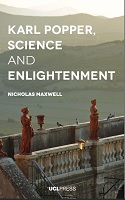Karl Popper, Science and Enightenment
| dc.contributor.editor | Maxwell, Nicholas | |
| dc.date.accessioned | 2017-08-01 23:55:55 | |
| dc.date.accessioned | 2019-01-11 13:45:08 | |
| dc.date.accessioned | 2020-04-01T13:26:10Z | |
| dc.date.available | 2020-04-01T13:26:10Z | |
| dc.date.issued | 2017 | |
| dc.identifier | 636791 | |
| dc.identifier | OCN: 1192302804 | en_US |
| dc.identifier.uri | http://library.oapen.org/handle/20.500.12657/31176 | |
| dc.description.abstract | Here is an idea that just might save the world. It is that science, properly understood, provides us with the methodological key to the salvation of humanity. A version of this idea can be found in the works of Karl Popper. Famously, Popper argued that science cannot verify theories but can only refute them, and this is how science makes progress. Scientists are forced to think up something better, and it is this, according to Popper, that drives science forward. But Nicholas Maxwell finds a flaw in this line of argument. Physicists only ever accept theories that are unified – theories that depict the same laws applying to the range of phenomena to which the theory applies – even though many other empirically more successful disunified theories are always available. This means that science makes a questionable assumption about the universe, namely that all disunified theories are false. Without some such presupposition as this, the whole empirical method of science breaks down. By proposing a new conception of scientific methodology, which can be applied to all worthwhile human endeavours with problematic aims, Maxwell argues for a revolution in academic inquiry to help humanity make progress towards a better, more civilized and enlightened world. | |
| dc.language | English | |
| dc.subject.classification | thema EDItEUR::C Language and Linguistics::CF Linguistics::CFA Philosophy of language | en_US |
| dc.subject.classification | thema EDItEUR::Q Philosophy and Religion::QD Philosophy | en_US |
| dc.subject.classification | thema EDItEUR::Q Philosophy and Religion::QD Philosophy::QDH Philosophical traditions and schools of thought | en_US |
| dc.subject.classification | thema EDItEUR::Q Philosophy and Religion::QD Philosophy::QDT Topics in philosophy::QDTK Philosophy: epistemology and theory of knowledge | en_US |
| dc.subject.other | civilization | |
| dc.subject.other | reason | |
| dc.subject.other | karl popper | |
| dc.subject.other | the enlightenment | |
| dc.subject.other | science | |
| dc.subject.other | intellectual revolution | |
| dc.subject.other | education | |
| dc.subject.other | Albert Einstein | |
| dc.subject.other | Alberta Order of Excellence | |
| dc.subject.other | Empiricism | |
| dc.subject.other | Falsifiability | |
| dc.subject.other | Metaphysics | |
| dc.subject.other | Physicalism | |
| dc.subject.other | Quantum mechanics | |
| dc.subject.other | Scientific method | |
| dc.subject.other | Theoretical physics | |
| dc.title | Karl Popper, Science and Enightenment | |
| dc.type | book | |
| oapen.identifier.doi | 10.2307/j.ctt1vxm8p6 | |
| oapen.relation.isPublishedBy | df73bf94-b818-494c-a8dd-6775b0573bc2 | |
| oapen.relation.isbn | 9781787350397 | |
| oapen.pages | 390 | |
| oapen.remark.public | Relevant Wikipedia pages: Albert Einstein - https://en.wikipedia.org/wiki/Albert_Einstein; Alberta Order of Excellence - https://en.wikipedia.org/wiki/Alberta_Order_of_Excellence; Empiricism - https://en.wikipedia.org/wiki/Empiricism; Falsifiability - https://en.wikipedia.org/wiki/Falsifiability; Karl Popper - https://en.wikipedia.org/wiki/Karl_Popper; Metaphysics - https://en.wikipedia.org/wiki/Metaphysics; Physicalism - https://en.wikipedia.org/wiki/Physicalism; Quantum mechanics - https://en.wikipedia.org/wiki/Quantum_mechanics; Scientific method - https://en.wikipedia.org/wiki/Scientific_method; Theoretical physics - https://en.wikipedia.org/wiki/Theoretical_physics | |
| oapen.identifier.ocn | 1192302804 |

